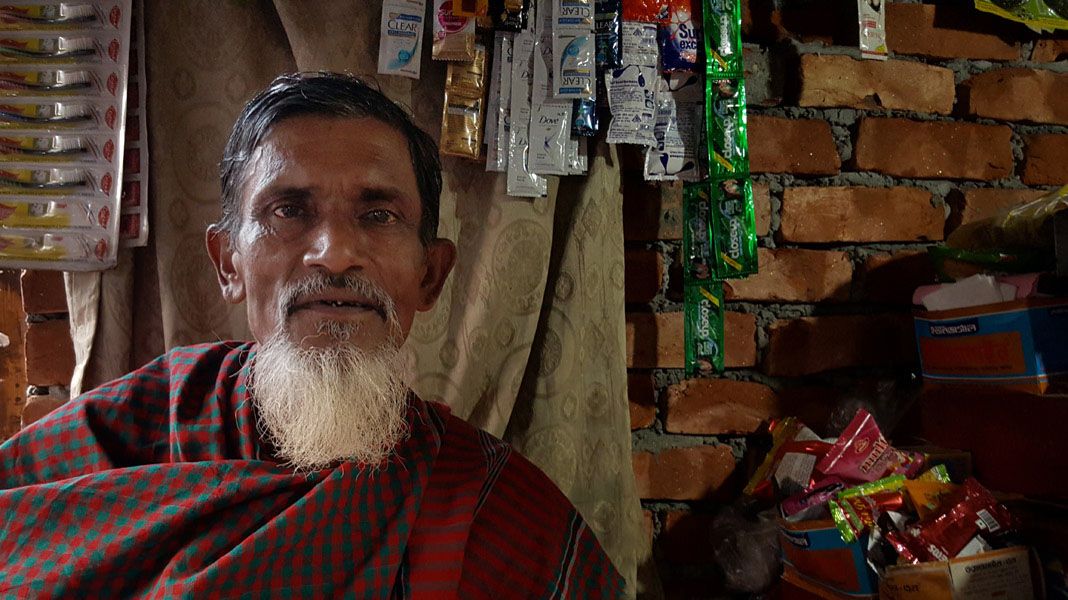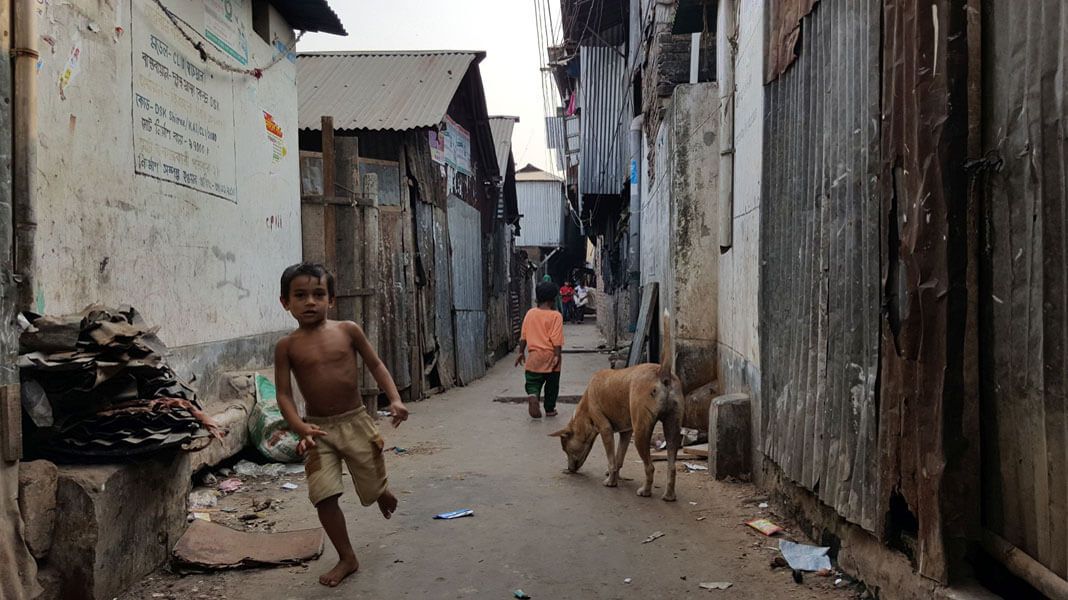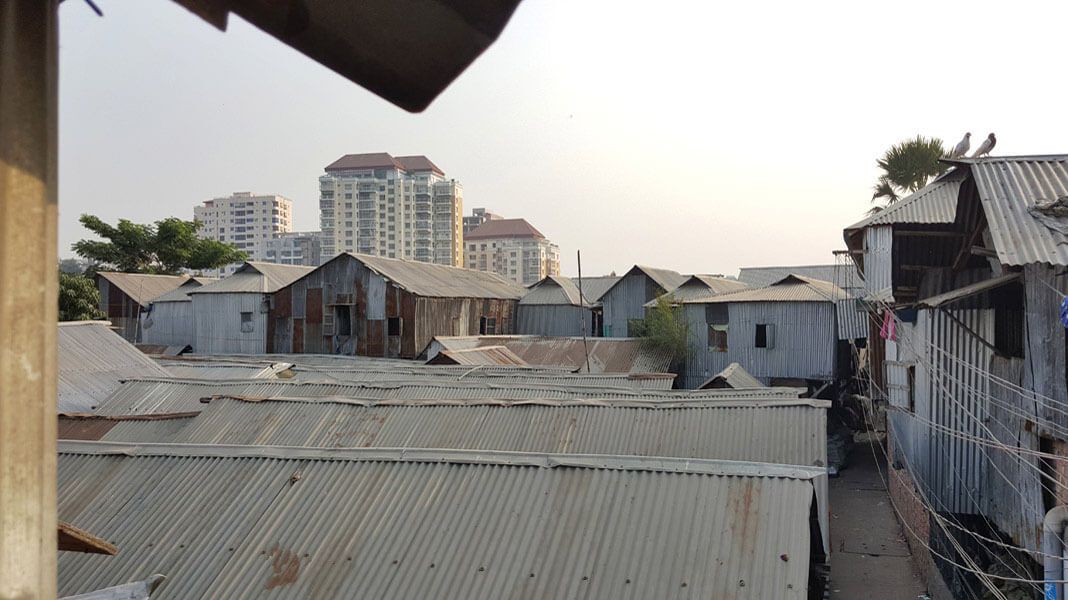The economy of Bangladesh grows rapidly, with 6% on average per year. Bangladesh envisions to become an upper-middle-income country by 2031. Though, not everyone benefits from this growth. Especially, people living in the coastal belt are suffering.
Foreign investments increase and a lot of money is being earned in the garments industry. Having said that, it is especially the Bengali guest labourers who work in the Middle East and send remittances to their families, that add most to the growing gross domestic product (GDP) of Bangladesh. Not everyone benefits from this GDP growth. Particularly, people in the coastal areas are vulnerable.
In the rainy monsoon season, the power of the river and tides causes bank erosion. Every now and then, entire villages get washed away. Now, the resilience of these coastal people is being put to the test even more as a result of climate change. Increasing temperatures, salinisation and cyclones cause crop failures, making living in the coastal belt of Bangladesh increasingly challenging for its people. They increasingly migrate and many of them end up in one of the overpopulated slums in the capital Dhaka.
Like here in Korail, with around 300 thousand inhabitants the largest slum of the city. The contrast with the neighbouring diplomatic area could not be greater. I walk zigzagging through alleys that provide shadow and coolness. There are shops, barbours and tea stalls, where you can also watch cricket. People live in poor circumstances: closely packed together, crammed in like sardines in their homes made of bamboo and corrugated plates. It stinks by the water and there is garbage everywhere.
In one of the alleys, I meet the 73-years old Gazi Rahman. He is squatting in front of his shop and pours a cup of tea for me. “In the early nineties, I lived in the coastal area near Khulna. I rented a piece of land with a pond and I cultivated shrimps. Suddenly, the shrimps fell ill and I lost my harvest and money. I fled for my creditors and took a bus to Dhaka. There, I let myself fall on the sidewalk. A few days later, people took me to Korail.”

The corruption of power
In the 90’s, the government took possession of the land on which the slum is built and tried to clear the land several times, using bulldozers. Undeveloped land was gradually, but definitely unlawfully, taken by government officials and other influential people, who started renting out land to slum dwellers.
Due to a lack of affordable homes in Dhaka, Korail attracted more and more people. Although, there were no latrines and electricity, water and gas had to be illegally wiretapped, individual land owners benefitted from the influx of migrants and land prices jumped up.
The slum dwellers were financially squeezed and of all people, they – the vulnerable group that is struggling to survive, to get drinking water, that is fighting against diseases – they are hit hardest by the climate crisis. For them, climate change is not something abstract and far away, but an everyday reality. They have to deal with more intense and extreme rainfall and an increasing average summer temperature, on top of the heat caused by the busy traffic of Dhaka.
The residents of Korail are suffering, Rahman says. “More and more often, rainwater leaks into the houses. Water with feces that floats out of the sewerage system, in combination with drinking water shortages, causes diseases, especially among children.”

Korail is being crushed further and further as a result of population growth, poor water management and climate change
Population growth, poor water management and climate change are putting the residents of Korail under ever increasing stress. Under these challenging circumstances, Rahman developed a new life. He started as a rickshaw driver and had many other jobs before he opened his tea stall.
Just like Rahman, many other local people in Korail add significant value to the local economy. Many of them work in garments, as a maid, garbage collector, taxi driver or cleaner, and contribute to the local economy of Dhaka by doing so. They are crucial for smooth functioning of the economy.
Though, despite their indispensable contributions to the local economy, the slum dwellers remain excluded from basic services, because they are living in a slum. In Korail, electricity is illegally wiretapped and health care, education and social services are non-existent.
Yet, Rahman has seen the situation improving, especially because of the support provided by development organisations. “Now the alleys are paved, piped water supply systems have been constructed and we have money to extend our home with a second floor.”
This story of change is confirmed by Priscilla Raj of development organisation Rural Advancement Committee (BRAC). “We offer services that government does not provide”, she says. “Examples include micro credits, primary schools and birth centers where women can deliver hygienically and under medical guidance.” BRAC started off in rural areas, but became active in Dhaka when migration to the city set in.

How is the situation improved?
Raj explains how especially women and adolescent girls benefit from clean drinking water and improved sanitation facilities. “When Korail was connected to piped water in 2013, women and adolescent girls won time as they did no longer have to spent hours a day on fetching water. They could start working, open a shop with our micro loans, or attend one of the primary schools which we founded. In addition to clean water, the new latrines and bathing facilities also contributed to improved hygiene and health, especially for children and during menstruation.”
BRAC has a noble mission, but reality can be dirty. Slum dwellers pay far too high rents to influential, local people. Even water in the slum is more expensive than in the diplomatic neighbourhood next to it. And when developing organisations improve the living conditions with their projects, slumlords increase the rent again.
“This system gives us headaches”, says Priscilla Raj. “The poor are being squeezed by the rich. But the slum is a reality. We cannot solve this problem at once, because where can the slum dwellers go? What alternative do they have?”
Lisa van Gerwen is founder of ViaLisa, a development organisation that helps poor adolescents to prepare for the job market with vocational education. According to her, development organisations need to improve their coordination for the sake of the slum dwellers. Improved coordination is crucial to further improve their living conditions and wellbeing.
“We want to open a public library which could at the same time be used as a general information and education center by other development organisations in the area. Unfortunately, this seems to be impossible. A missed opportunity, because the residents would benefit if we would combine our forces.”
Just like BRAC, Van Gerwen observes that more women are working. “But that also means that the girls at home have to carry a heavier load”, she says. “Maybe it is a form of empowerment, but maybe they are being forced because of poverty. You cannot see that from the outside.”
In her training center, adolescents learn reading, calculating and writing. They are also accompanied in their careers at businesses that do not exploit them or that let them do dangerous work. When the adolescents are learning, their younger siblings are taken care of in child care. This way, both their parents can work.
Rahman too benefits from the improvements. “Since recently I am living without debts again”, he says proudly. He lives behind his shop with his wife and six children. “We earn more money, because we rent out a small space under our roof and we all work. My son is following education to become a taxi driver, my youngest daughter goes to school and the other three work in garments.”
The opportunities in Korail attract new people again
The opportunities in Korail attract new people again. Every year, Dhaka has to welcome 500 thousand new residents. Individual landowners benefit, but the slums can hardly tolerate the pressure. There is a constant shortage of everything; a shortage of clean water, latrines, work and schools. The growing and unpredictable urban planning in Dhaka is a threat to the development of Bangladesh.
But it is not only doom and gloom in Korail. There is also hope and ambition. Like, Gazi Rahman who works hard for a better future. He wants to return to his birth village one day. “I am saving money to build a house, because sooner or later the government will demolish this slum. Then we need to leave this place.”
This story was partly made possible by the Dutch Lottery Fund for journalists from Free Press Unlimited.




